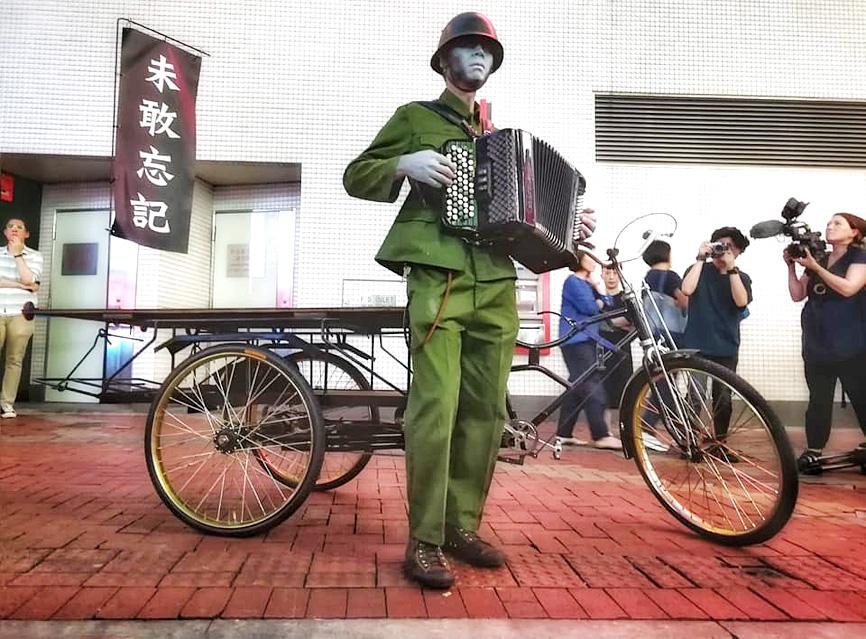One of Hong Kong’s best-known artists yesterday confirmed that he had moved to Taiwan in search of “100 percent freedom” from the Hong Kong government’s crackdown on dissent.
Kacey Wong’s (黃國才) departure is the latest blow to Hong Kong’s reputation as a regional haven for the arts and free speech as government critics face growing scrutiny from authorities.
Wong, 51, posted a black-and-white video on Facebook in which he sung a rendition of Vera Lynn’s wistful ode We’ll Meet Again.

Photo copied by Chen Cheng-liang, Taipei Times
“Leaving is not easy, staying is also difficult,” he wrote.
In an interview with the Hong Kong Free Press Web site, Wong confirmed that he had fled Hong Kong for political reasons, citing the diminishing space for artistic freedom since China imposed a National Security Law that criminalized much dissent.
The Cornell-educated artist is known for his contemporary visual arts focusing on social activism and politics.
In one 2018 performance art piece called The Patriot, Wong performed China’s national anthem on an accordion while inside a red metal cage.
Last year, authorities passed new laws making it illegal to mock China’s national anthem or flag, meaning any repeat of such a performance would be fraught with risk.
“I want and I demand 100 percent freedom, with no compromise,” Wong told Hong Kong Free Press.
“I always appreciated Taiwan’s culture and art, I think it’s very mature and deep and the society is sophisticated and raw at the same time, which I like,” he added.
Earlier this year, Wong distributed hundreds of candle stubs from previous vigils marking Beijing’s deadly Tiananmen Square crackdown after Hong Kong authorities banned public commemorations.
The arts have been heavily affected by the security law, which was introduced to quash dissent after pro-democracy protests two years ago.
All films must now be censored for any content that breaches the law and multiple books have been pulled from shelves.
On Monday, Cantopop star Anthony Wong (黃耀明) was charged with “corrupt conduct” for singing at an election rally of a pro-democracy politician three years ago.
Two authors of a children’s book that likened democracy supporters to sheep surrounded by wolves were charged with sedition last month.
Despite this, Hong Kong Chief Executive Carrie Lam (林鄭月娥) has insisted that freedom of speech remains intact in the territory.
“I would honestly ask you, what sort of freedoms have we lost, what sort of vibrancy has Hong Kong been eroded?” she said in a radio show late last month.

Taiwan has received more than US$70 million in royalties as of the end of last year from developing the F-16V jet as countries worldwide purchase or upgrade to this popular model, government and military officials said on Saturday. Taiwan funded the development of the F-16V jet and ended up the sole investor as other countries withdrew from the program. Now the F-16V is increasingly popular and countries must pay Taiwan a percentage in royalties when they purchase new F-16V aircraft or upgrade older F-16 models. The next five years are expected to be the peak for these royalties, with Taiwan potentially earning

POSITIVE DEVELOPMENT: Japan and the US are expected to hold in-depth discussions on Taiwan-related issues during the meeting next month, Japanese sources said The holding of a Japan-US leaders’ meeting ahead of US President Donald Trump’s visit to China is positive news for Taiwan, former Japan-Taiwan Exchange Association representative Hiroyasu Izumi said yesterday. After the Liberal Democratic Party’s landslide victory in Japan’s House of Representatives election, Japanese Prime Minister Sanae Takaichi is scheduled to visit the US next month, where she is to meet with Trump ahead of the US president’s planned visit to China from March 31 to April 2 for a meeting with Chinese President Xi Jinping (習近平). Japan and the US are expected to hold in-depth discussions on Taiwan-related issues during the

‘LIKE-MINDED PARTNER’: Tako van Popta said it would be inappropriate to delay signing the deal with Taiwan because of China, adding he would promote the issue Canadian senators have stressed Taiwan’s importance for international trade and expressed enthusiasm for ensuring the Taiwan-Canada trade cooperation framework agreement is implemented this year. Representative to Canada Harry Tseng (曾厚仁) in an interview with the Central News Agency (CNA) said he was increasingly uneasy about Ottawa’s delays in signing the agreement, especially as Ottawa has warmed toward Beijing. There are “no negotiations left. Not only [is it] initialed, we have three versions of the text ready: English, French and Mandarin,” Tseng said. “That tells you how close we are to the final signature.” Tseng said that he hoped Canadian Prime Minister Mark Carney

STAY IN YOUR LANE: As the US and Israel attack Iran, the ministry has warned China not to overstep by including Taiwanese citizens in its evacuation orders The Ministry of Foreign Affairs (MOFA) yesterday rebuked a statement by China’s embassy in Israel that it would evacuate Taiwanese holders of Chinese travel documents from Israel amid the latter’s escalating conflict with Iran. Tensions have risen across the Middle East in the wake of US and Israeli airstrikes on Iran beginning Saturday. China subsequently issued an evacuation notice for its citizens. In a news release, the Chinese embassy in Israel said holders of “Taiwan compatriot permits (台胞證)” issued to Taiwanese nationals by Chinese authorities for travel to China — could register for evacuation to Egypt. In Taipei, the ministry yesterday said Taiwan